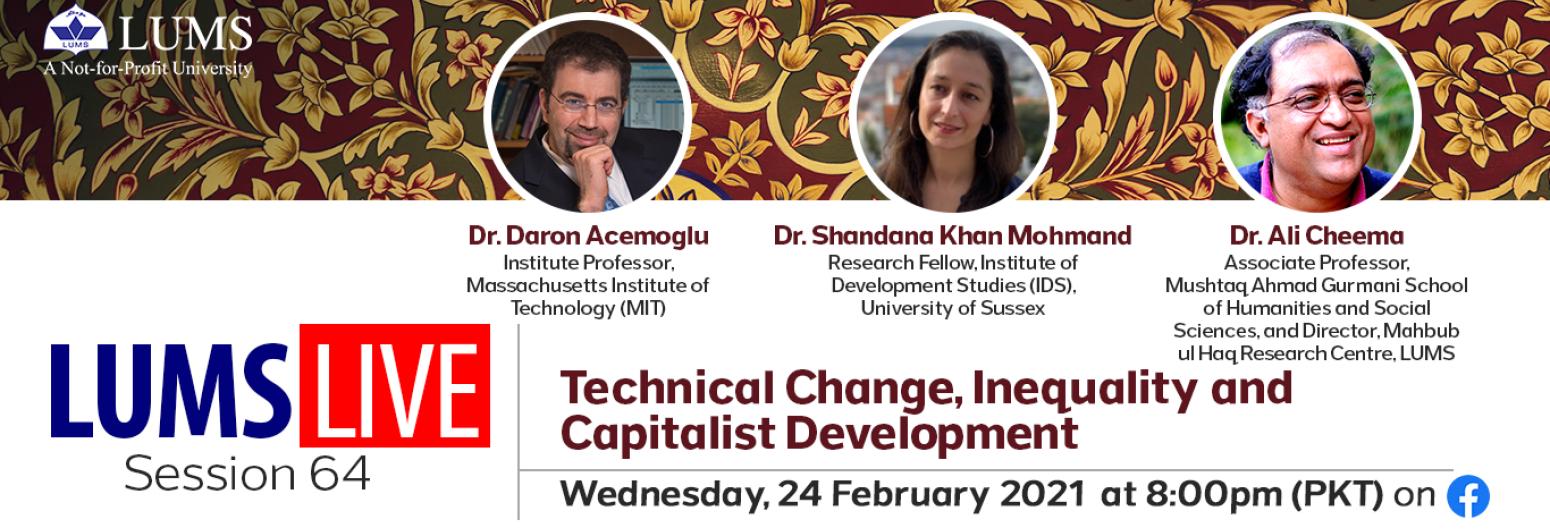
February 24, 2021
Renowned Professor Daron Acemoglu, Institute Professor, Massachusetts Institute of Technology (MIT) will be discussing the evolution of technical change in capitalist economies and its implications for the 21st-century challenges of rising wage inequality and political polarization. He will examine the role of policies in influencing the direction of labour-saving technical change.
Date: Wednesday, February 24, 2021
Time: 8:00 pm (PKT)
Hosted in collaboration with the Mahbub ul Haq Research Centre (MHRC) as part of their Mahbub ul Haq Distinguished Lectures 2021, the session will be moderated by Dr. Shandana Khan Mohmand and Dr. Ali Cheema.
Join us for this interesting conversation!
Panelists
Professor Daron Acemoglu - Institute Professor, Massachusetts Institute of Technology (MIT)
Professor Acemoglu is an elected fellow of the National Academy of Sciences, the American Academy of Arts and Sciences, the Econometric Society, and the Society of Labour Economists. His academic work covers a wide range of areas, including political economy, economic development, economic growth, inequality, labour economics, and economics of networks. He is the author of five books, including the highly acclaimed Why Nations Fail: Power, Prosperity, and Poverty and The Narrow Corridor: States, Societies, and the Fate of Liberty (both with James A. Robinson). Professor Acemoglu has received numerous awards and prizes, including the Carnegie Fellowship in 2017, the Jean-Jacques Laffont Prize in 2018, and the Global Economy Prize in 2019. He was awarded the John Bates Clark Medal in 2005, the Erwin Plein Nemmers Prize in 2012, and the 2016 BBVA Frontiers of Knowledge Award.
Dr. Ali Cheema – Associate Professor, Mushtaq Ahmad Gurmani School of Humanities and Social Sciences, and Director, Mahbub ul Haq Research Centre, LUMS
Dr. Cheema is co-lead academic of the LSE-Oxford based International Growth Centre’s Pakistan programme and was a founding member of the 2006 Stockholm Challenge Award winning portal, Relief Information System for Earthquakes, Pakistan (risepak.com). He is also a Senior Research Fellow at the Institute of Development and Economic Alternatives (IDEAS) Pakistan and co-founder of the Centre for Economic Research in Pakistan (CERP). He is a member of the Board of Trustees of the Institute of Development Studies (IDS), Sussex. His recent work is on governance, public finance, and human capital acquisition, which has published in leading international journals and conferences. A Rhodes Scholar, he holds a BA (Hons) in Politics and Economics from Oxford and a PhD in Economics from Cambridge. He has served as a member of Pakistan’s National Finance Commission and was a visiting Fulbright Scholar at Harvard.
Dr. Shandana Khan Mohmand – Research Fellow, Institute of Development Studies, University of Sussex
Dr. Mohmand is a Fellow and lead of the Governance Team at the Institute of Development Studies, University of Sussex, an Associate Fellow at the Institute of Development and Economic Alternatives (IDEAS), Pakistan and has a PhD in Development Studies. Her main area of research is democratisation, political participation, inequality, and the political economy of public policy and service delivery. She has contributed to both policy and social science research, using varied methodological strategies to investigate these issues in South Asia, the Western Balkans and sub-Saharan Africa. Dr. Mohmand is the author of Crafty Oligarchs, Savvy Voters: Democracy Under Inequality in Rural Pakistan.



















